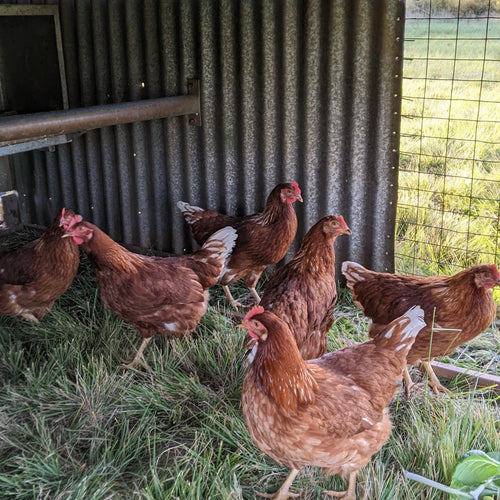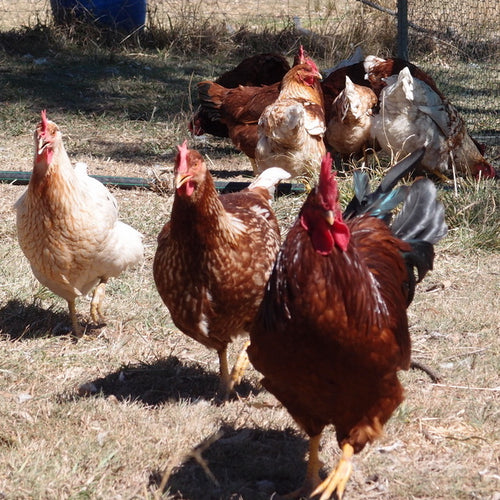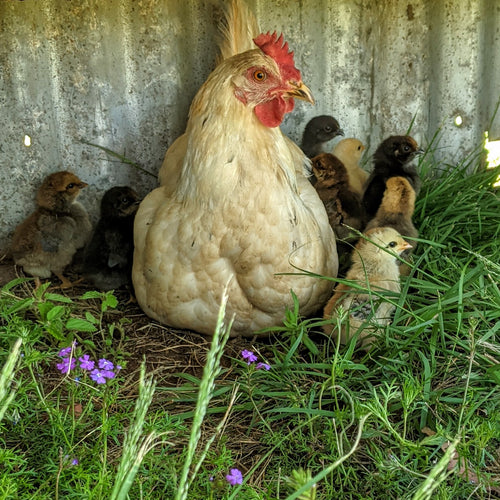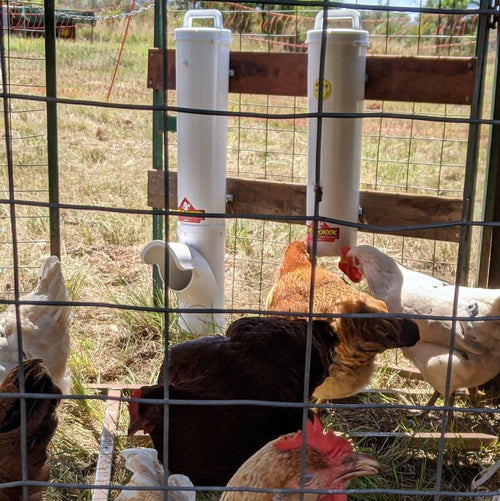Five beginner questions about backyard chickens
At my work I’m known as “the egg lady” because I occasionally bring in our excess eggs to sell. The eggs are very popular and fights have been known to occur over the last carton in the fridge. As a result I am often sought out by people who are “thinking about getting chickens”. The questions are always the same, so I thought there are probably other people who would like to know about this too. I firmly believe that there are no stupid questions about chickens. When I first moved in with my husband, Pete, he already had chickens, and I clearly remember being surprised that they needed to be fed grain. I must have thought that they lived off vege scraps! So it’s not long ago that I was also a chicken novice with very basic questions!
How many chickens should we get?
This depends on how many eggs you want and how much space you have. Assuming that you have the space, I would say four or five hens for a family of four if you want about one egg each a day. The caveat is that the hens will only lay one egg a day when they are young. When they reach around two years old you will not get one egg a day. You need to have a plan for when this happens.
Do you keep feeding these older hens and accept that you get fewer eggs? Will you have space to add two more hens to boost production? Hens can live for ten years, are you prepared to keep them that long when they are not laying many eggs? Are you happy to cull the older hens? (That’s what we do, they make excellent chicken stock). Ideally you should start with a small number of hens and add a few new hens each year and cull the older hens so that you are always getting a good number of eggs.
How much space do they need?
Chickens only need a small space to roost at night and somewhere sheltered to keep their nesting boxes and food and water, but they need more space during the day to stretch their legs. If you can let the chickens out to free-range in your garden, you can get away with a small coop for night-time (around one square metre per chicken would be fine), however you need to make sure that while your chickens are free-ranging they are safe from your dog, your neighbour’s dog and that they aren’t going to dig up your precious garden beds.
If you can’t let your chickens free-range, they will need a larger permanent chicken coop; they will need about three square metres each. Unfortunately chickens tend to scratch up the dirt and eat every last bit of greenery in a run, no matter how large, so it helps to be able to rotate them into different areas to let the ground recover and the plants regrow.
A good alternative is a “chicken tractor”, this is a cage on wheels, it can be relatively small if you move it regularly over your lawn or pasture. Half the size of the fixed coop is sufficient if you move then daily. The chickens are protected, but they get access to grass and insects and leave their manure to fertilise your grass! There is no coop to clean either. This is my preferred option and great for backyards and larger properties alike. If you also let the chickens free-range, you can use a smaller chicken tractor.
Do you need a rooster?
If you just want eggs, you only need hens, no rooster. The eggs will be infertile, so you need a rooster if you want to hatch eggs. Most urban areas prohibit roosters anyway. If you are in a rural area, you need one rooster for every eight to ten chickens if you want fertile eggs. I think the rooster has a role to play in protecting the flock from predators as well, but that’s another story.
What do you feed the chickens?
The most recent person to discuss chickens with me told me that his family ate a lot of eggs, but that he did not buy my eggs because they were “too expensive” (at $5 a carton). He was thinking of getting chickens to save money on eggs. I guess he thinks I’m making a massive profit. But I’m not; I’m just covering the cost of feeding our chickens! Chicken feed will be the most costly input, and yes, I learnt that they do need some grain, no matter how much vege scraps and grass they have access to!
You can buy various chicken feed from produce stores. Layer pellets with everything included, or a scratch grain mix (which means you also need to feed shell grit and minerals). Having tried many different options, we currently buy a milled grain mix and supplement with shell grit and minerals. We also feed meal worms and compost worms. The chickens free-range most days, so they access grass and insects. The more you can feed the chickens from what you grow in your garden, the more you will save on chicken feed.
What about when I go away on holidays?
We have left chickens in chicken tractors for up to one week. We leave extra food and water and they have always been fine when we got back. This is a last resort however, if you have friendly neighbours you can usually persuade someone to check on your chickens in exchange for eggs.
I always encourage people to think about getting chickens if they like animals and eat plenty of eggs. It does take a bit of work to set up suitable housing for chickens, and to look after them, but it’s worth it for the amazing eggs (and everyone at work will be your friend!).
Read more posts about chickens here
Books about chickens that I find useful:

























Hi Liz great posts. Old country girl here now confined to small plot,would love a farm/farmhouse update and dog news of course!
Leave a comment